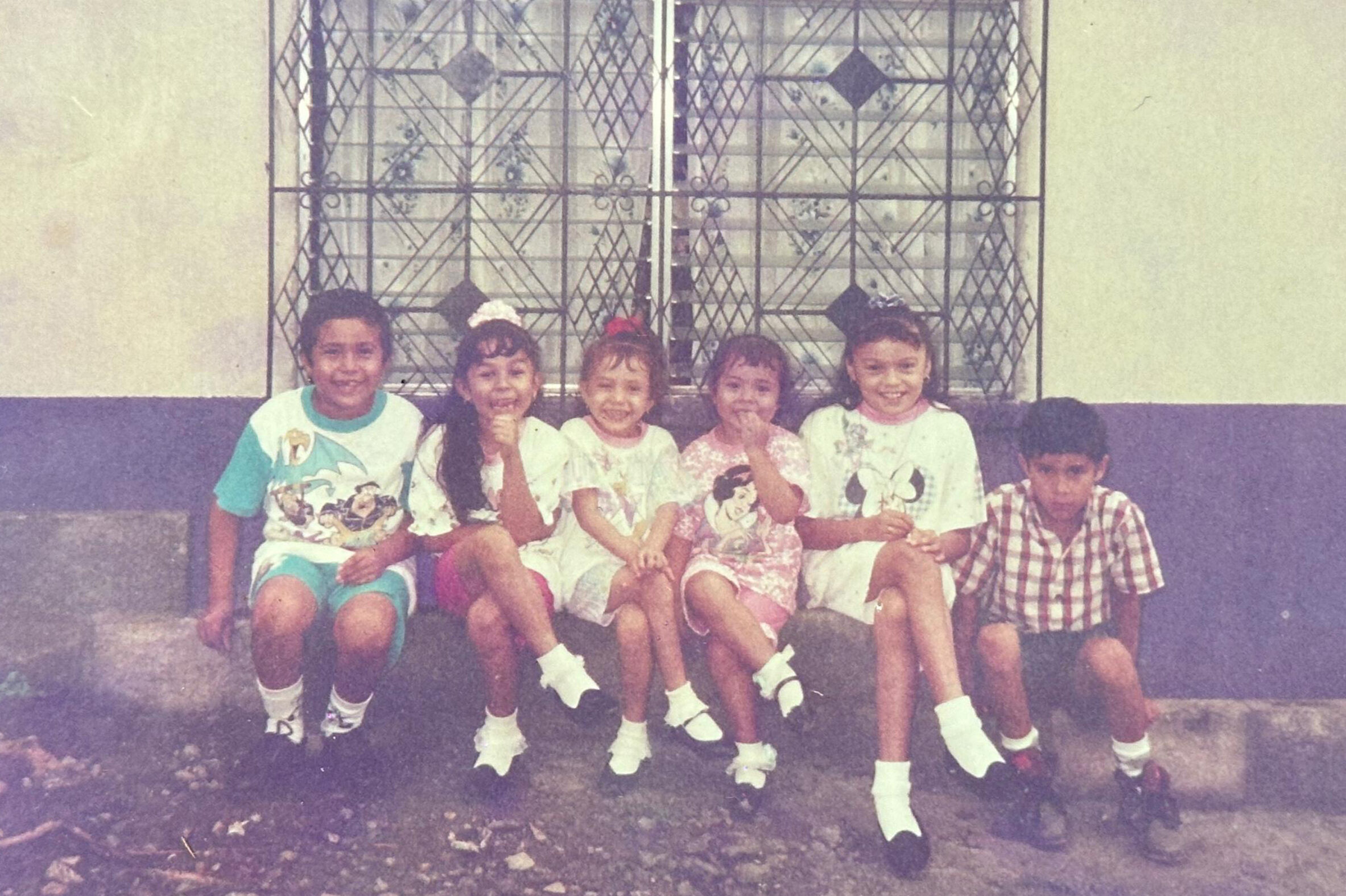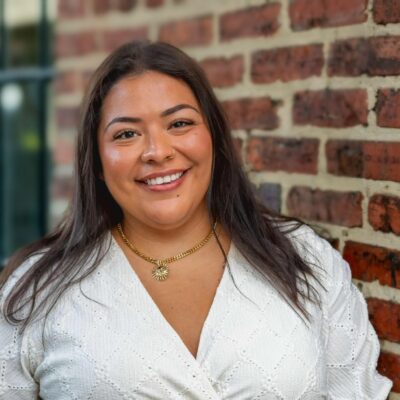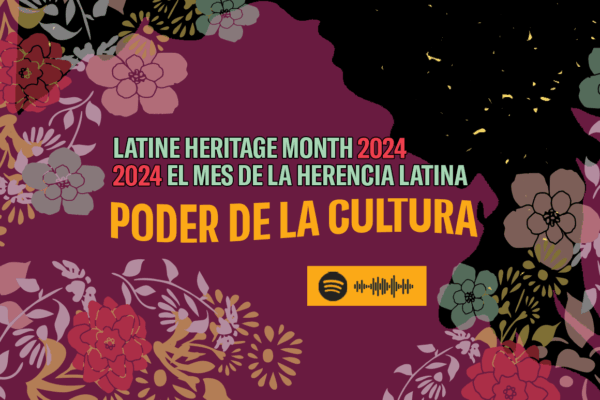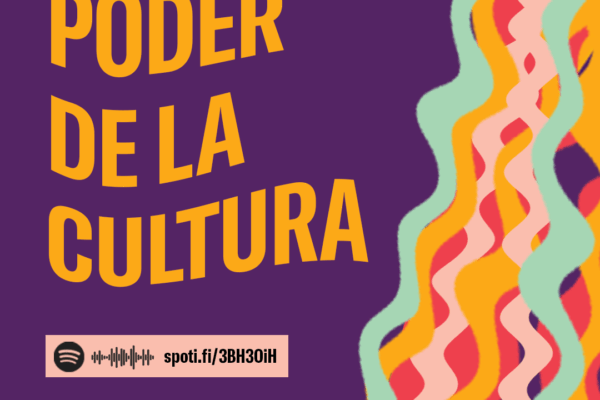A Story of Love, Family, and the Impact of Immigration
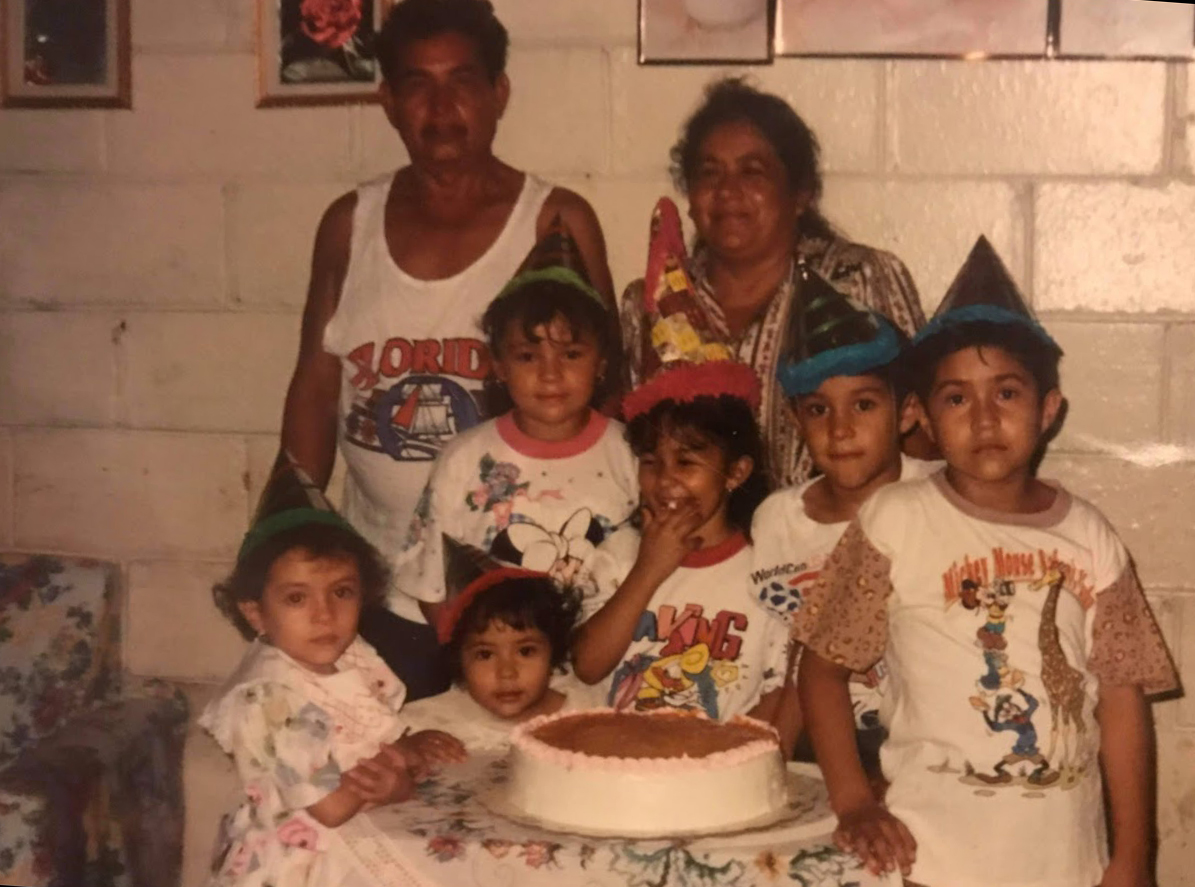
Photo: My grandparents Jose Gilberto "Beto" y Digna Candelaria My cousins Maria "Tita", me, Gilma, Leslie, Antonio "Toñito", and Jorge.
Growing up in El Salvador was a beautiful experience. I cherish it deeply. Whenever I’m in the States, I find myself longing for those lazy afternoons, swinging in a hammock – my music in the air as I cool down on hot days at my favorite spot, “El Rancho” (a gazebo-like structure that my grandfather and father helped build). I can still hear my grandmother and aunts calling out “Lorenita” from the kitchen. Their voices carried over to me in El Rancho, letting me know it was time to clean up and gather for dinner. My grandparents, whom I lovingly call mami y papi, created a home, filled with love and warmth for my sister, cousins, and me – a place where I made many cherished memories.
Photos: 1. My grandparents Digna Candelaria and Jose Gilberto "Beto"; 2. My grandparents Digna Candelaria and Jose Gilberto "Beto"; 3. My paternal grandparents Digna Candelaria and Jose Gilberto "Beto"; 4. My grandparents Digna Candelaria and Jose Gilberto "Beto".
In June of '93, when I was barely 3 months old, my parents made a difficult decision. Opposite of what one might expect, they put me on a plane headed to El Salvador from Baltimore. A few years earlier, they had also sent my older sister, Leslie, at 2 years old, to live with my paternal grandparents and members of my extended family after the brutal Salvadoran Civil War and mass fleeing. The only difference with me was how young I was.
My parents, Berta and Jeremias, said sending my sister and I away was one of the hardest things they had to do. But it had to be done. Long hours, working multiple jobs, to sustain themselves and their families back home meant that El Salvador was a better decision for their daughters. While El Salvador may not have been able to provide my parents with a life of peace and comfort, maybe it could do that for their children. So, they took that risk.
Photos: 1. My parents Jeremias and Berta with my sister Leslie; 2. Me in Baltimore; 3. Me in Baltimore; 4. I'm getting baptized at a catholic church in San Salvador the ones holding me are my God parents and my grandparents are to the side.
The Salvadoran Civil War lasted from 1979 to 1992. Words can’t describe the horror and trauma that people experienced during that time and beyond – more than 80,000 deaths were documented and thousands more remain unaccounted for. Families were separated; children either went missing, were stolen, or forced to become child soldiers. In the years leading up to the war, the country was filled with violence and poverty. This led to deep-rooted inequities that permeated Salvadoran society and painted my parent’s childhood.
In the early 80's, my parents and countless family members, fled their homes and sought refuge in the US. Sadly, asylum was not in the cards for them. Only 2 percent of the thousands of people fleeing from civil wars in Central America – wars that were funded by the United States no less – were granted asylum. My parents were put in a desperate position: they had to cross the border with the help of "coyotes." A coyote is a person who guides people across the Mexican-US border. Safe passage is never guaranteed, with arrest, murder, and rape being among the various risks. The safer the passage, the higher the price, with some paying upwards of $15,000. My mom, Berta, was almost 14, and my dad, Jeremias, was around 18 when they separately made the dangerous trip. A few years later, their paths would cross. My parents then made Baltimore their home (and eventually, mine).
Photos: 1. Celebrating Father's Day From the back Marina (Tita's mom), Jorge, my grandmother holding Maria "Tita", leslie, my grandfather, Antonio "Toñito", Gilma; 2. My greatgrandmother Noy, my grandmother Digna, and friends; 3. My aunt Roxana and me; 4. Jorge, Antonio "Toñito", my grandmother, and Gilma; 5. From the top: Mi tio Gilberto "Betio", Betty, mi abuela, mis tias Leonor "Noy" y Roxana; 6. My grandparents with my cousin Gilma celebrating her birthday.
As teenagers, my parents came to a new country for a life away from war. They left behind everything and everyone they knew for a new world where they didn’t even know the language. Still, my parents say that sending us to live with my father's parents was the most difficult decision of it all.
For my grandparents, poverty and war ripped away their chance to watch my parents fully grow up. So, I like to think that my grandparents' raising us gave them another chance to provide the love, care, and attention that they couldn’t for their own children. This also gave my own parents the opportunity to establish themselves in a new country.
For many, thinking of El Salvador conjures up images of gang violence, war, poverty, and displacement. A society marred by intractable inequity. All of this is true, and sadly, an enduring part of our history. And yet for me, when I think about El Salvador, my thoughts are those of love and family.
Photos: 1. My sister Leslie and me; 2. My grandmoter holding me, lower left is Leslie my sister, middle is my cousin Maria "Tita", and to the far right is my cousin, Gilma / me, Leslie, and my grandmother for Leslies birthday; 3. My cousins Gilma, Jorge, Antonio "Toñito", Leslie, me, and Carmen "Tita"; 4. Me and my classmate / Me with my doll; 5. Pre-K Graduation for my classmates.
Thinking of El Salvador, I think of Digna Candelaria and Jose Gilberto. Or Niña Digna and Don Beto, as the folks in town call them. My grandparents are the greatest gift that the country gave me. They taught me the traditions I hold onto dearly. My grandfather taught me to love and respect nature and how to live off the land. Together, we share an admiration of using herbs and roots for home remedies. My grandfather homeschooled me in El Rancho, teaching me how to read and write in Spanish. (I was expelled from my pre-K and Kindergarten classes for being rebellious. A story for another time!)
Photos: 1. Celebrating my birthday; 2. My cousins Gilma, Maria "Tita", me, and Leslie, and my cousins Jorge, Antonio "Toñito", and Rolando Jose / Town celebration me holding a gift for the procession 3. Playing dress up: Maria "Tita, Jorge, Gilma, me, and Leslie; 4. Celebrating my 5th birthday with Gilma, my grandmother holding my cousin Melissa, Leslie, Rolando Jose, me, Maria "Tita", Jorge / Me, my cousin Gilma, my cousin Melissa and my cousin maria "tita".
Thinking of El Salvador, I reminisce about growing up with my cousins. Though we came from different mothers and fathers, we were still siblings. There were six of us: Gilma, Jorge, Antonio (Toñito), Leslie, Maria (Tita), and me. We nicknamed ourselves the "Original 6," a title that stuck even as more cousins joined the family as time went on. For a while, it was just us, running around the house pretending to be Power Rangers, lost in our own world of imagination. Our grandparents would host talent shows in our living room. They turned it into a lively stage where we sang and danced, sharing our creativity with my aunts and neighbors who gathered around to enjoy the fun. Now that we live in different countries, that bond remains strong. Our shared experiences growing up created a foundation of love and connection that borders can't break.
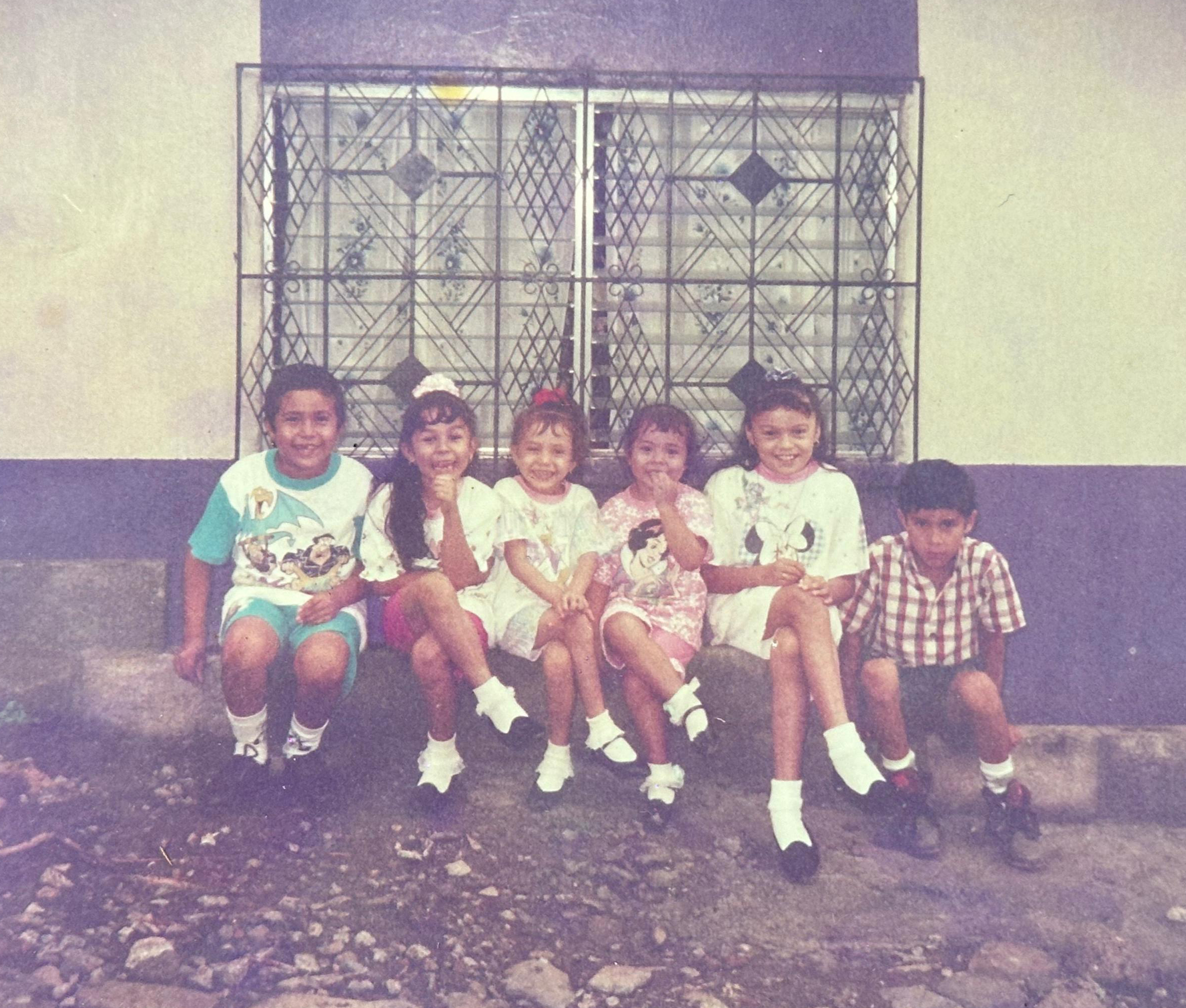
Photo: When we moved back to San Gerardo after the peace treaties. This is infront of our family home: Jorge, Leslie, Maria "Tita", me, Gilma, and Antonio "Toñito".
Thinking of El Salvador, I remember my aunts, Leonor (Noy) and Roxana. Every morning, they would help us get ready for whatever plans they had for the day, alongside my grandmother. In the afternoons, we’d gather in the kitchen, where they would cook traditional foods, especially pupusas or bistec encebollado and fresh tortillas. The aroma in the kitchen was comforting. Those meals were central to our days, and the kitchen became a space where we’d hear all the chisme in town or any news from the states. In the evenings, my aunts would sing and dance with me until I fell asleep, and if not, I would cry. They often joked that I was living up to my name, Magdalena. They were alluding to the Catholic saying, “You’re going to cry like Mary Magdalene,” which highlights her well-known reputation for deep sorrow. Perhaps my aunts’ bedtime dancing and singing was where my love of music and dancing truly began.
Thinking of El Salvador, I see San Gerardo, mi barrio lindo, surrounded by trees, mountains, and rivers. The rivers and lakes give life and abundance to the people in town. Living in El Salvador taught me the importance of this kind of community. Because when the government failed us, we always had each other, and the land that gave nourishment back to us.
I left El Salvador in the summer of ‘99. It was the hardest goodbye. I was leaving behind everything I knew and my favorite person, my grandmother, who had been a mom to me all those years. My aunt Leonor and my grandfather were tasked with sending us off. To this day, I get emotional when I hear “Hoja en Blanco” by Monchy y Alexandra, because this was the last song my aunt played for us as we left San Gerardo and made our way to San Salvador. The car ride to the airport felt like an eternity. But at the same time, it felt too short.
Even after we left, my parents made sure we went back to visit every year. They knew how important spending summers with our grandparents were, though they were unable to return to El Salvador themselves, due to the United States' restricted immigration system. Berta and Jeremias were forced to wait over 15 years before being reunited with their parents, my grandparents. Our stories are part of the collective immigrant story.
Photos: 1. My grandmother and me; 2. My cousin Gilma, my grandmother and me; 3. Mixing up coffee ground and maiz mix; 4. Mixing up coffee ground and maiz mix.
This is why the immigrants’ rights work at the ACLU of Maryland is so deeply personal to me. I think of my family and loved ones as I advocate for immigrants across the state, ensuring they are protected from police abuse and discrimination. I fight to uplift their opportunities and rights, along with the autonomy of their families.
My grandfather’s favorite spot in El Salvador was the same as mine, El Rancho. He spent most afternoons resting in the hammocks hung across the room, as I do whenever I’m there. There was space in El Rancho for his makeshift workshop to repair shoes and sharpen machetes. Every morning at 5 a.m., my grandfather woke up and walked down to the workshop. By hand, he would separate and roast fresh coffee beans for our family. In his final years, he passed down this tradition to my cousin, Gilma. He did this to ensure that my grandmother always had a freshly brewed cup of coffee each morning.
Papi passed away last year. To this day, El Rancho is where I go to feel closer to him. When it rains, especially during thunderstorms, I go with my cup of coffee and sweet bread to listen to some music while the storm passes. It has become my safe space. That is what El Salvador means to me and why no matter where I am, my heart will always have two homes between two different worlds.
Cuando regreso, estoy en casa. Es mi hogar.
When I go back, I am home. It is home.

